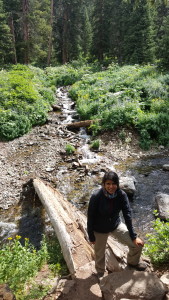 Reina Galvan grew up in Montrose, Colo., and during her time at CSU she has traveled from one coast to the other studying wildlife.
Reina Galvan grew up in Montrose, Colo., and during her time at CSU she has traveled from one coast to the other studying wildlife.
She surveyed the southwestern willow flycatcher and the yellow-billed cuckoo in New Mexico, monitored piping plover nests on Fire Island in New York and is currently studying a marine bird, the Brandt’s cormorant, found on Alcatraz Island in California.
Galvan transferred to CSU from Knox College in Illinois, where she was pursuing a double major in environmental studies and French. In high school, she was her school’s first Hispanic female valedictorian, which made her Mexican-born parents extremely proud.
As a first-generation college student, Galvan said she wasn’t quite sure what was “out there” in terms of her higher education options. But she quickly figured out what she wanted to do after a class at Knox College took her to Alaska, where she worked with wildlife experts on salmon habitat restoration.
She asked them, “If I wanted to do what you’re doing in the future, what should I be studying?” The response was wildlife biology, which wasn’t offered at Knox.
Her next move was a no-brainer. “I wanted to come back to Colorado,” she said. “I missed the mountains and snowboarding. CSU really stood out, as the Warner College of Natural Resources was really well-known. That’s what got me into it and here.”
Galvan is a member of the Honors Program and a Daniels Scholar. Once she graduates on Dec. 18, she may study butterflies in the Florida Keys National Wildlife Refuge or stay on campus to finish — and perhaps publish — her Honors thesis research. She also has an internship lined up in Alaska through Cornell University that starts in April 2016. Eventually, she plans to apply to the Peace Corps Master’s International program, which pairs graduate studies with volunteer service abroad.
Her advice to others, not surprisingly, is to get as much experience as you can during college. “It’s important to get out there and do things, whether it’s an internship or volunteering,” Galvan said. “You can find out what you like and if you like being outside in hot, muggy, environments, or if you’re not capable of doing that.”
Galvan also said it’s important to learn about the field side and office side of research. “It’s good to see how those two facets interact and how doing things right in the field is important for the data management. It lets you see how all the pieces fit,” she said.